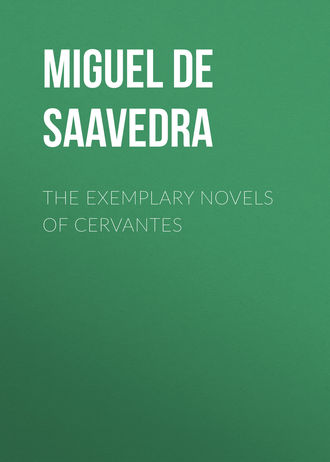 полная версия
полная версияThe Exemplary Novels of Cervantes
Having thus soliloquised, not once but a hundred times on that day, and the two or three following, Carrizales had an interview with Leonora's parents, and found that, although poor, they were persons of good birth. He made known his intention to them, acquainted them with his condition and fortune, and begged them very earnestly to bestow their daughter upon him in marriage. They required time to consider his proposal, and to give him also an opportunity to satisfy himself that their birth and quality was such as they had stated.
The parties took leave of each other, made the necessary inquiries, found them satisfactory on both sides, and finally Leonora was betrothed to Carrizales, who settled upon her twenty thousand ducats, so hotly enamoured was the jealous old bridegroom. But no sooner had he pronounced the conjugal "yes," than he was all at once assailed by a host of rabid fancies; he began to tremble without cause and to find his cares and anxieties come thicker and faster upon him than ever. The first proof he gave of his jealous temper was, in resolving that no tailor should take measure of his betrothed for any of the many wedding garments he intended to present her. Accordingly, he went about looking for some other woman, who might be nearly of the same height and figure as Leonora. He found a poor woman, who seemed suitable for his purpose, and having had a gown made to her measure, he tried it on his betrothed, found that it fitted well, and gave orders that it should serve as a pattern for all the other dresses, which were so many and so rich that the bride's parents thought themselves fortunate beyond measure, in having obtained for themselves and their daughter a son-in-law and a husband so nobly munificent. As for Leonora, she was at her wit's end with amazement at the sight of such gorgeous finery, for the best she had ever worn in her life had been but a serge petticoat and a silk jacket.
The second proof of jealousy given by Felipe was, that he would not consummate his marriage until he had provided a house after his own fancy, which he arranged in this singular manner. He bought one for twelve thousand ducats, in one of the best wards of the city, with a fountain and pond, and a garden well stocked with orange trees. He put screens before all the windows that looked towards the street, leaving them no other prospect than the sky, and did much the same with all the others in the house. In the gateway next the street, he erected a stable for a mule, and over it a straw loft, and a room for an old black eunuch, who was to take care of the mule. He raised the parapets round the flat roof of the house so high, that nothing could be seen above them but the sky, and that only by turning one's face upwards. In the inner door, opening from the gateway upon the quadrangle, he fixed a turning box like that of a convent, by means of which articles were to be received from without. He furnished the house in a sumptuous style, such as would have become the mansion of a great lord; and he bought four white slave girls, whom he branded in the face, and two negresses. For the daily supplies of his establishment he engaged a purveyor, who was to make all the necessary purchases, but was not to sleep in the house or ever enter it further than to the second door, where he was to deposit what he had brought in the turning box. Having made these arrangements, Carrizales invested part of his money in sundry good securities; part he placed in the bank, and the rest he kept by him to meet any emergencies that might arise. He also had a master key made for his whole house; and he laid up a whole year's store of all such things as it is usual to purchase in bulk at their respective seasons; and everything being now ready to his mind, he went to his father-in-law's house and claimed his bride, whom her parents delivered up to him with no few tears, for it seemed to them as if they were giving her up for burial.
Leonora knew not, poor young creature, what was before her, but she shed tears because she saw her parents weep, and taking leave of them with their blessing, she went to her new home, her husband leading her by the hand, and her slaves and servants attending her. On their arrival Carrizales harangued all his domestics, enjoining them to keep careful watch over Leonora, and by no means, on any pretence whatsoever, to allow anybody to enter within the second gate, not even the black eunuch. But the person whom above all others he charged with the safe keeping and due entertainment of his wife was a dueña of much prudence and gravity, whom he had taken to be Leonora's monitress, and superintendent of the whole house, and to command the slaves and two other maidens of Leonora's age whom he had also added to his family, that his wife might not be without companions of her own years. He promised them all that he would treat them so well, and take such care for their comfort and gratification, that they should not feel their confinement, and that on holidays they should every one of them without exception be allowed to go to mass; but so early in the morning that daylight itself should scarcely have a chance of seeing them. The servant maids and the slaves promised to obey all his orders cheerfully and with prompt alacrity and the bride, with a timid shrinking of her shoulders, bowed her head, and said that she had no other will than that of her lord and spouse, to whom she always owed obedience.
Having thus laid down the law for the government of his household, the worthy Estramaduran began to enjoy, as well as he could, the fruits of matrimony, which, to Leonora's inexperienced taste, were neither sweet-flavoured nor insipid. Her days were spent with her dueña, her damsels, and her slaves, who, to make the time pass more agreeably, took to pampering their palates, and few days passed in which they did not make lots of things in which they consumed a great deal of honey and sugar. Their master gladly supplied them with all they could wish for in that way without stint, for by that means he expected to keep them occupied and amused, so that they should have no time to think of their confinement and seclusion. Leonora lived on a footing of equality with her domestics, amused herself as they did, and even in her simplicity took pleasure in dressing dolls and other childish pastime. All this afforded infinite satisfaction to the jealous husband; it seemed to him that he had chosen the best way of life imaginable, and that it was not within the compass of human art or malice to trouble his repose: accordingly his whole care was devoted to anticipating his wife's wishes by all sorts of presents, and encouraging her to ask for whatever came into her head, for in everything it should be his pleasure to gratify her.
On the days she went to mass, which as we have said was before daylight, her parents attended at church and talked with their daughter in presence of her husband, who made them such liberal gifts as mitigated the keenness of their compassion for the secluded life led by their daughter. Carrizales used to get up in the morning and watch for the arrival of the purveyor, who was always made aware of what was wanted for the day by means of a note placed over-night in the turning box. After the purveyor had come and gone, Carrizales used to go abroad, generally on foot, locking both entrance doors behind him – that next the street, and that which opened on the quadrangle, – and leaving the negro shut up between them. Having despatched his business, which was not much, he speedily returned, shut himself up in his house, and occupied himself in making much of his wife and her handmaids, who all liked him for his placid and agreeable humour, and above all for his great liberality towards them. In this way they passed a year of novitiate, and made profession of that manner of life, resolved every one of them to continue in it to the end of their days; and so it would have been, if the crafty perturber of the human race had not brought their chaste purposes to nought, as you shall presently hear.
Now, I ask the most long-headed and wary of my readers, what more could old Felipe have done in the way of taking precautions for his security, since he would not even allow that there should be any male animal within his dwelling? No tom-cat ever persecuted its rats, nor was the barking of a dog ever heard within its walls; all creatures belonging to it were of the feminine gender. He took thought by day, and by night he did not sleep; he was himself the patrol and sentinel of his house, and the Argus of what he held dear. Never did a man set foot within the quadrangle; he transacted his business with his friends in the street; the pictures that adorned his rooms were all female figures, flowers, or landscapes; his whole dwelling breathed an odour of propriety, seclusion, and circumspection; the very tales which the maid servants told by the fireside in the long winter nights, being told in his presence, were perfectly free from the least tinge of wantonness. Her aged spouse's silver hairs seemed in Leonora's eyes locks of pure gold; for the first love known by maidens imprints itself on their hearts like a seal on melted wax. His inordinate watchfulness seemed to her no more than the due caution of an experienced and judicious man. She was fully persuaded that the life she led was the same as that led by all married women. Her thoughts never wandered beyond the walls of her dwelling, nor had she a wish that was not the same as her husband's. It was only on the days she went to mass that she set eyes on the streets, and that was so early in the morning, that except on the way home she had not light to look about her. Never was there seen a convent more closely barred and bolted; never were nuns kept more recluse, or golden apples better guarded; and yet for all his precautions poor Felipe could not help falling into the pit he dreaded, – or at least believing that he had so fallen.
There is in Seville an idle pleasure-seeking class of people who are commonly called men on town,80 a sauntering, sprucely dressed, mellifluous race, always finding means to make, themselves welcome at rich men's feasts. Of these people, their manners and customs, and the laws they observe among themselves, I should have much to say, but abstain from it for good reasons. One of these gallants, a bachelor, – or a virote, as such persons are called in their jargon, the newly married being styled matones, – took notice of the house of Carrizales, and seeing it always shut close, he was curious to know who lived there. He set about this inquiry with such ardour and ingenuity, that he failed not to obtain all the information he desired. He learned the character and habits of the old man, the beauty of Leonora, and the singular method adopted by her husband in order to keep her safe. All this inflamed him with desire to see if it would not be possible, by force or stratagem, to effect the reduction of so well-guarded a fortress. He imparted his thoughts to three of his friends, and they all agreed that he should go to work, for in such an enterprise no one lacks counsellors to aid and abet him. At first they were at a loss how to set about so difficult an exploit; but after many consultations they agreed upon the following plan: – Loaysa (so the virote was named) disappeared from among his friends, giving out that he was leaving Seville for some time. Then drawing on a pair of linen drawers and a clean shirt, he put over them a suit of clothes so torn and patched, that the poorest beggar in the city would have disdained to wear such rags. He shaved off the little beard he had, covered one of his eyes with a plaster, tied up one of his legs, and hobbling along on two crutches, appeared so completely metamorphosed into a lame beggar, that no real cripple could have looked less of a counterfeit than he.
In this guise he posted himself closely at the hour of evening prayer before the door of Carrizales' house, which was fast shut, and Luis the negro locked up between the two doors. Having taken up his position there, Loaysa produced a greasy guitar, wanting some of its strings, and as he was something of a musician, he began to play a few lovely airs, and to sing Moorish ballads in a feigned voice, with so much expression that all who were passing through the street stopped to listen. The boys all made a ring round him when he sang, and Luis the negro, enchanted by the virote's music, would have given one of his hands to be able to open the door, and listen to him more at his ease, such is the fondness for music inherent in the negro race. When Loaysa wanted to get rid of his audience, he had only to cease singing, put up his guitar, and hobble away on his crutches.
Loaysa four or five times repeated this serenade to the negro, for whose sake alone he played and sang, thinking that the way to succeed in his sap and siege was to begin by making sure of old Luis; nor was his expectation disappointed. One night when he had taken his place as usual before the door, and had begun to time his guitar, perceiving that the negro was already on the alert, he put his lips to the key-hole and whispered, "Can you give me a drop of water, Luis? I am dying with thirst, and can't sing."
"No," said the negro, "for I have not the key of this door, and there is no hole through which I can give you drink."
"Who keeps the key, then?"
"My master, who is the most jealous man in the world; and if he knew that I was now talking here with any one, it were pity of my life. But who are you who ask me for water?"
"I am a poor cripple, who get my bread by asking alms of all good people in God's name; besides which I teach the guitar to some moriscoes, and other poor people. Among my pupils I have three negroes, slaves to three aldermen, whom I have taught so well that they are fit to sing and play at dance or in any tavern, and they have paid me for it very well indeed."
"A deal better would I pay you to have the opportunity of taking lessons; but it is not possible, for when my master goes out in the morning he locks the door behind him, and he does the same when he comes in, leaving me shut up between two doors."
"I vow to God, Luis, if you would only contrive to let me in a few nights to give you lessons, in less than a fortnight I would make you such a dabster at the guitar, that you need not be ashamed to play at any street corner; for I would have you to know that I have an extraordinary knack in teaching; moreover, I have heard tell that you have a very promising capacity, and from what I can judge from the tone of your voice, you must sing very well."
"I don't sing; badly; but what good is that since I don't know any tunes, except the 'Star of Venus,' or, 'In the green meadow,' or the tune that is now so much in vogue, 'Clinging to her grated window, with a trembling hand?'"
"All these are moonshine to what I could teach you, for I know all the ballads of the Moor Abendaraez, with those of his lady Xarifa, and all those comprising the history of the grand sofi Tomunibeyo, and the divine sarabands which enchant the souls of the Portuguese themselves, among whom they are most in vogue; and all these I teach by such methods and with such facility, that almost before you have swallowed three or four bushels of salt, you will find yourself an out-and-out performer in every kind of guitar music."
"What's the good of all that," (here the negro sighed heavily,) "since I can't get you into the house?"
"There's a remedy for all things: contrive to take the keys from your master, and I will give you a piece of wax, with which you may take an impression of the wards, for I have taken such a liking to you, I will get a locksmith, a friend of mine, to make new keys, and then I can come in at night and teach you to play better than Prester John in the Indies. It is a thousand pities that a voice like yours should be lost for want of the accompaniment of the guitar; for I would have you to know, brother Luis, that the finest voice in the world loses its perfection when it is not accompanied by some instrument, be it guitar or harpsichord, organ or harp; but the instrument that will suit your voice best is the guitar, because it is the handiest and the least costly of all."
"All that is very good; but the thing can't be done, for I never get hold of the keys, nor does my master ever let them out of his keeping; day and night they sleep under his pillow."
"Well, then, there's another thing you may do, if so be you have made up a mind to be a first-rate musician; if you haven't, I need not bother myself with advising you."
"Have a mind, do you say? Ay, and to that degree that there is nothing I wouldn't do, if it were possible anyhow, for sake of being able to play music."
"Well, if that's the case, you have only to scrape away a little mortar from the gate-post near the hinge, and I will give you, through that opening, a pair of pincers and a hammer, with which you may by night draw out the nails of the staple, and we can easily put that to rights again, so that no one will ever suspect that the lock was opened. Once shut up with you in your loft, or wherever you sleep, I will go to work in such style that you will turn out even better than I said, to my own personal advantage, and to the increase of your accomplishments. You need not give yourself any concern about what we shall have to eat. I will bring enough to last us both for more than a week, for I have pupils who will not let me be pinched."
"As for that matter we are all right; for with what my master allows me, and the leavings brought me by the slave-girls, we should have enough for two more besides ourselves. Only bring the hammer and pincers, and I will make an opening close to the hinge, through which you may pass them in, and I will stop it up again with mud. I will take the fastenings out of the lock, and even should it be necessary to give some loud knocks, my master sleeps so far off from this gate, that it must be either a miracle or our extraordinary ill luck if he hears them."
"Well, then, with the blessing of God, friend Luis, in two days from this time you shall have everything necessary for the execution of your laudable purpose. Meanwhile, take care not to eat such things as are apt to make phlegm, for they do the voice no good, but a deal of harm."
"Nothing makes me so hoarse so much as wine, but I would not give it up for all the voices above ground."
"Don't think I would have you do so; God forbid! Drink, Luis my boy, drink; and much good may it do you, for wine drunk in measure never did any one harm."
"I always drink in measure. I have a jug here that holds exactly three pints and a half. The girls fill this for me unknown to my master, and the purveyor brings me on the sly a bottle holding a good gallon, which makes up for the deficiency of the jug."
"That's the way to live, my boy, for a dry throat can neither grunt nor sing."
"Well, go your ways now, and God be with you; but don't forget to come and sing here every night until such time as you bring the tools for getting you within doors. My fingers itch to be at the guitar."
"I'll come, never fear, and I'll bring some new tunes too."
"Ay, do; but before you go away now, sing me something that I may go to sleep pleasantly; and for the matter of payment, be it known to the señor pobre that I will be more liberal than many a rich man."
"Oh, I ain't uneasy on that score. If you think I teach you well, I will leave it to yourself to pay me accordingly. And now I'll just sing you one song, but when I am inside you will see wonders."
Here ended this long dialogue, and Loaysa sang a sprightly ditty with such good effect, that the negro was in ecstacies, and felt as if the time for opening the door would never arrive.
Having finished his song, Loaysa took his departure, and set off at a rounder pace than might have been expected of a man on crutches, to report to his friends what a good beginning he had made. He told them what he had concerted with the negro, and the following day they procured tools of the right sort, fit to break any fastening as if it was made of straw. The virote failed not to serenade the negro, nor the latter to scrape at the gate-post till he had made a sufficiently wide hole, which he plastered up so well, that no one could perceive it unless he searched for it on purpose. On the second night Loaysa passed in the tools, Luis went to work with them, whipped off the staple in a trice, opened the door, and let in his Orpheus. Great was his surprise to see him on his two crutches, with such a distorted leg, and in such a tattered plight. Loaysa did not wear the patch over his eye, for it was not necessary, and as soon as he entered he embraced his pupil, kissed him on the cheek, and immediately put into his hand a big jar of wine, a box of preserves, and other sweet things, with which his wallet was well stored. Then throwing aside his crutches, he began to cut capers, as if nothing ailed him, to the still greater amazement of the negro.
"You must know, brother Luis," said Loaysa, "that my lameness does not come of natural infirmity, but from my own ingenious contrivance, whereby I get my bread, asking alms for the love of God. In this way, and with the help of my music, I lead the merriest life in the world, where others, with less cleverness and good management, would be starved to death. Of this you will be convinced in the course of our friendship."
"We shall see," said the negro; "but now let us put this staple back in its place, so that it may not appear that it has been moved."
"Very good," said Loaysa, and taking out some nails from his wallet, he soon made the lock seem as secure as ever, to the great satisfaction of the negro, who, taking him at once to his loft, made him as comfortable there as he could. Luis lighted a lamp; Loaysa took up his guitar, and began to strike the chords softly and sweetly, so that the poor negro was transported with delight. After he had played awhile, he drew forth a fresh supply of good things for a collation, which they partook of together, and the pupil applied himself so earnestly to the bottle that it took away his senses still more than the music had done. Supper over, Loaysa proposed that Luis should take his first lesson at once; and though the poor negro was too much fuddled to distinguish one string from another, Loaysa made him believe that he had already learnt at least two notes. So persuaded was the poor fellow of this, that he did nothing all night but jangle and strum away. They had but a short sleep that night. In the morning, just on the strike of six, Carrizales came down, opened both entrance doors, and stood waiting for the purveyor, who came soon afterwards; and after depositing the day's supplies in the turning-box, called the negro down to receive his ration and oats for the mule. After the purveyor was gone, old Carrizales went out, locking both doors after him, without having seen what had been done to the lock of one of them, whereat both master and pupil rejoiced not a little.
No sooner was the master of the house gone, than the negro laid hold on the guitar, and began to scrape it in such a manner, that all the servant maids came to the second door, and asked him, through the turning-box, "What is this, Luis? How long have you had a guitar? Who gave it you?"
"Who gave it me? The best musician in the world, and one who is to teach me in six days more than six thousand tunes!"
"Where is he, this musician?" said the dueña.
"He is not far off," replied the negro; "and if it were not for fear of my master, perhaps I would tell you where at once, and I warrant you would be glad to see him."
"But where can he be for us to see him," returned the dueña, "since no one but our master ever enters this house?"
"I will not tell you any more about the matter till you have heard what I can do, and how much he has taught me in this short time."
"By my troth, unless he is a demon who has taught you, I don't know how you can have become a musician all at once."
"Stop a bit and you shall hear him, and mayhap you will see him too some day."
"That can't be," said another of the women, "for there are no windows on the street through which we could hear or see anybody."
"Never mind" said the negro; "there's a remedy for everything but death. If you only could or would keep silence – "
"Keep silence! Ay that we will, brother Luis, as if we were born dumb. I give you my word, friend, I am dying to hear a good voice, for ever since we have been shut up here we have not even heard the birds sing."









